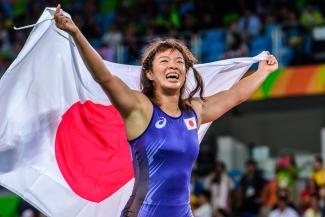#WrestleTokyo Women's Wrestling Previews
Thursday, June 24, 2021 - 02:31 By United World Wrestling Press

Women’s Wrestling Previews
50kg
In one of those wild twists of fate that adds to the appeal of sports, Yanan SUN (CHN) and Mariya STADNIK (AZE) can be indirectly credited with helping Yui SUSAKI (JPN) get to the Tokyo Olympics.
Now those two and the rest of the field in the women's 50kg division will have to contend with the unintended result of their largesse. Although unseeded, Susaki will be the prohibitive favorite when they all take to the mat at Makuhari Messe on Aug. 6-7.
53kg
Vinesh PHOGAT (IND) got over the physical pain she suffered at the Rio 2016 Olympics long before the emotional scars healed. Five years later, that bitter memory is fueling her quest to become India's first-ever Olympic wrestling gold medalist.
57kg
In her bid for a second straight Olympic title, Risako KAWAI (JPN) had to beat a fellow champion from the Rio 2016 Olympics just to make the Japanese team. At the Tokyo Games, she might have to contend with yet another Rio gold medalist.
Kawai, the top seed and reigning world champion at women's 57kg, faces a possible showdown with unseeded Helen MAROULIS (USA), whose stunning victory over the legendary Saori YOSHIDA (JPN) in the 53kg final made her the first American woman to win an Olympic wrestling gold and was one of the highlights of the Rio competition.
62kg
Since women's wrestling was added to the Olympic program in 2004, only six countries have won gold medals, with Japan the dominant power by winning 11 of the 18 handed out. At the Tokyo Olympics, the country with the best chance of joining that elite group is a small former Soviet republic in central Asia.
68kg
Many athletes might cringe at the near-monastic life awaiting them under the harsh pandemic protocols at the Olympics. Tamyra MENSAH-STOCK (USA) can't wait.
"I'm going to be fine," Mensah-Stock told the Japanese press at the U.S. team's pre-Olympic camp in central Japan. "I'm a homebody. I play video games, I karaoke, I literally stay at home when I'm in the States. This is what I love. This is perfect."
76kg
Although the question from a Japanese reporter was clumsily translated as: "You didn't place in Rio, now this time is revenging against your loss...?", Adeline GRAY (USA) got the drift. But the normally outgoing, media-accommodating American only responded curtly, "Next question. We can move on."
Even with an American-record five world titles to her name, the mention of her quarterfinal loss at the 2016 Rio Olympics still manages to hit a nerve. Conversely, it also motivates Gray to rectify the lack of an Olympic gold when she takes the mat at the upcoming Tokyo Games.
Gray, the reigning world champion and No. 1 seed, is the favorite in win the women's 76kg class and finally claim that elusive gold, but she will have to do it in a stacked field just as determined to keep that from happening.
Looking to deny Gray will be the three other medalists from the 2019 World Championships -- silver medalist Hiroe MINAGAWA (JPN) and bronze-medal winners Aline ROTTER FOCKEN (GER) and Epp MAEE (EST) --as well as defending Olympic champion Erica WIEBE (CAN), former Olympic gold medalist Natalia VOROBIEVA (RUS), former world champion Yasemin ADAR (TUR)....the list goes on. It's not going to be easy.


Share your thoughts.
Comments